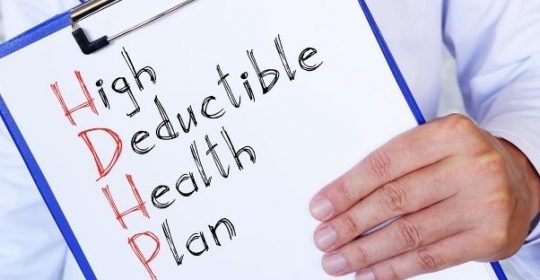
What is High Deductible Health Plan – HDHP?
If you’re a healthy individual or are wealthy enough to pay most of the medical costs out of pocket, the High Deductible Health Plan or HDHP is an excellent option for you. This plan is ideal for people who don’t need frequent medical treatment and want coverage for emergencies. Here’s an in-depth look at what you can expect from it:
What is High Deductible Health Plan?
HDHP is an insurance plan with a high minimum deductible range. A deductible is the amount of money you pay out of pocket before the insurance provider starts covering expenses. For example, if you need medical treatment in 2020 and the final bill is approximately $2,500, you will have to pay $1,400 out of pocket before the insurance steps in and pays the remaining $1,100.
These plans typically have a lower monthly premium, which makes them suitable for people who want to cut down their monthly budget and save more.
HDHP for 2020
The minimum deductible changes every year, so it is a good idea to keep an eye on the cost to ensure you know what to expect. Here’s a look at the plans for 2020:
- According to IRS, a plan is considered HDHP in 2020 if it has a high minimum deductible of $1,400 for individual and $2,800 in the case of a family. The annual out-of-pocket expenses cannot exceed $6,900 for individuals and $13,800 for a family. This doesn’t include any out-of-network medical expenses.
Once you reach the limit, your insurance plan pays all of the medical expenses as long as the treatment is from in-network providers.
Advantages of HDHP
HDHP is an ideal option for people who can self-insure and pay medical expenses out of their pocket. It is also the right choice for healthy individuals that don’t fall ill often, ensuring they have a safety net for medical emergencies but don’t have to deal with high monthly premiums.
Insured individuals are also eligible to the Health Savings Account or HSA, which allows them to contribute funds to the account for medical expenses that aren’t covered by HDHP. These funds aren’t considered taxable at the time of deposit, which means you can save money on tax as well. You don’t need to spend the money in the account within a year as the unused funds will roll over to the following year.
HSA tax-advantaged savings can be used in retirement after the early withdrawal penalty period has lapsed. This account can be an additional retirement fund to strength your future financial security.
Want to know more or need medical assistance? Reach out to us at Comprehensive Primary Care a Family Medicine Clinic. You can use our contact form or call (210) 899-4490.
Leave a reply →






I blog frequently and I seriously want to thank you for the detailed information. This article has piqued my interest. I’m going to take a note of your site and keep checking for new information about once per week.
Reply →Found your post interesting to read. I can’t wait to see your post soon. Good Luck with the upcoming update. This article is very useful, interesting, and effective.
Reply →Thanks for sharing such great information. It was really helpful to me. I always search to read the quality content and finally I found this in your post. keep it up!
Reply →Very well explained! I have learned many great things from your articles. I have been checking out all of your blogs as well, thanks for sharing this.
Reply →